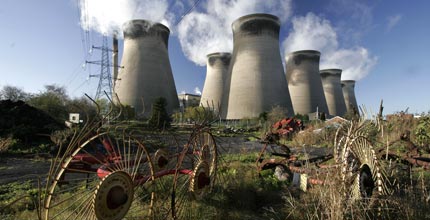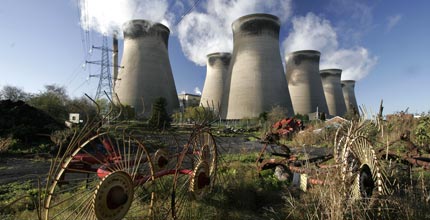“Give me coal,” Ernest Bevin, Britain’s immediate post-war foreign secretary told the nation’s miners 53 years ago, “and I’ll give you a foreign policy.”
 UK climate change secretary Ed MilibandWikimedia CommonsExhausted, and almost bankrupt after defeating Hitler’s Reich, but still insisting on maintaining a huge army and air force to remain a world power, Britain turned to its traditional source of wealth — the black gold that had made it an industrial nation.
UK climate change secretary Ed MilibandWikimedia CommonsExhausted, and almost bankrupt after defeating Hitler’s Reich, but still insisting on maintaining a huge army and air force to remain a world power, Britain turned to its traditional source of wealth — the black gold that had made it an industrial nation.
Now another rising British minister facing an even greater crisis — this time a planetary one — is effectively coining a new slogan. “Give me clean coal,” Ed Miliband seems to be saying, “and I’ll give you a climate policy.”
In an abrupt turnabout from previous policy, the young Secretary of State for Energy and Climate Change has set out to make Britain the first country in the world to make carbon capture and storage (CCS) technology compulsory for all new coal-fired power stations. Last week, he formally issued a consultation document laying out his plans, but no one has any doubt that they will be put into force.
“The era of unabated coal is over,” Miliband told Parliament.
It’s been a long era — more of an age, really. Coal has been mined in Britain since before the birth of Christ. The Romans found it in use when they came, and by the end of the second century AD were tapping almost every subsequently exploited coalfield in the country. Coal fueled the Industrial Revolution, powered the expansion of the British Empire, and long dominated the country’s energy supplies.
 Ernest Bevin, Britain’s foreign minister under the postwar Labour government, tied his country’s security to output from the coal mines.Wikimedia CommonsEven now, a quarter of a century since Mrs. Thatcher beat the miners and began the demise of the deep mining industry, coal still provides a third of Britain’s electricity, predominantly from opencast mines and imports. And yet it is emerging more and more clearly as the biggest global warming villain of all.
Ernest Bevin, Britain’s foreign minister under the postwar Labour government, tied his country’s security to output from the coal mines.Wikimedia CommonsEven now, a quarter of a century since Mrs. Thatcher beat the miners and began the demise of the deep mining industry, coal still provides a third of Britain’s electricity, predominantly from opencast mines and imports. And yet it is emerging more and more clearly as the biggest global warming villain of all.
James Hansen, long prophetic on climate change, calls it “the single greatest threat to all life on our planet.” And warnings of the devastating effects that global warming will have on Britain, as on the rest of the world, continue to mount: last week a report by its Metereological Office’s prestigious Hadley Centre warned that a two degree national temperature rise by 2040 was now inevitable, and warned of a future of droughts and floods unless urgent action is taken.
But until recently, the British government was turning a deaf ear and making plans (despite claiming to lead the world in combating climate change) to move back to coal. Last year Miliband’s predecessor as the top energy minister, the Blairite John Hutton, came within days of giving the go-ahead to build the country’s first coal-fired power station in 20 years.
Kingsnorth in Kent, in Britain’s southeast, was expected to be the first of some six such plants to be waved through. And there was to be no question of fitting it with CCS technology; leaked emails showed Hutton’s ministry to be colluding with the energy company to rule out the expensive technology. So, by itself, the plant would have emitted three times as much carbon dioxide each year as the entire country of Rwanda.
Even worse, Hutton and his own predecessor — Alistair Darling, now the Chancellor of the Exchequer — effectively stopped an attempt to build Britain’s first CCS plant in Scotland. Indeed, the most the government was prepared to do was to “consult” on making new plants “CCS-ready,” a virtually meaningless concept that would do little more than set aside space for it in the car park.
Miliband’s plan is to insist that all new coal-fired power stations immediately fit CCS to cover about a quarter of their emissions. They would then have to provide 100 percent coverage within five years of Britain’s Environment Agency pronouncing the technology proven, expected in about a decade. And, he has recently intimated, existing power stations might have to follow suit. The technological development would be funded by a two percent levy on electricity bills.
 The cooling towers of Ferrybridge power station in Britain.Greenpeace UKEnvironmentalists have welcomed the plan, though some want full CCS technology fitted at once. The government retorts that companies would then avoid building coal plants where carbon dioxide is removed after combustion and so the technology — which will be badly needed as China and India burn their coal — would not be developed.
The cooling towers of Ferrybridge power station in Britain.Greenpeace UKEnvironmentalists have welcomed the plan, though some want full CCS technology fitted at once. The government retorts that companies would then avoid building coal plants where carbon dioxide is removed after combustion and so the technology — which will be badly needed as China and India burn their coal — would not be developed.
And the government points out that a second form of CCS, where the coal is gasified and the carbon removed before it is burned, is achievable and produces the full reduction. It is planning to get two such pre-combustion plants built, alongside two post-combustion ones, and produces figures to show that this would save marginally more carbon than scrapping coal and building gas-fired plants instead.
Ultimately, of course, the government hopes the plan will give Britain an edge in a post-carbon world, just as Bevin hoped the country’s coal would in that distant post-war world.




